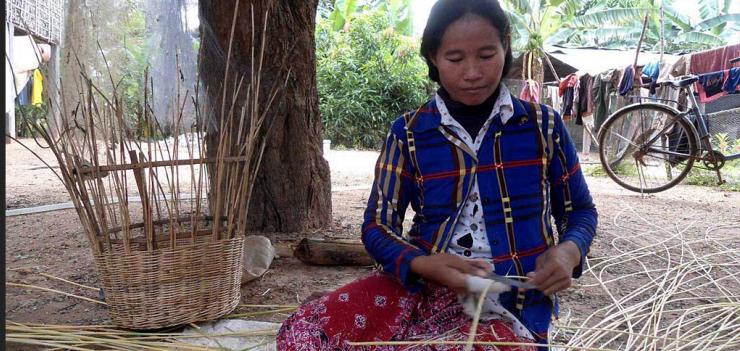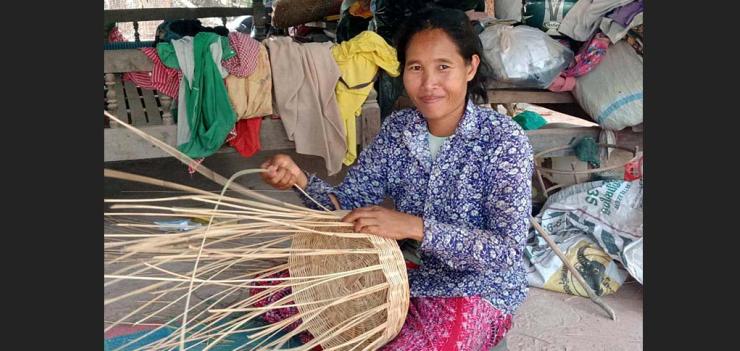In 2016, Mrs. Meas Phon and her family were living below the poverty line. Meas, aged 40, previously had been supporting herself and her six children successfully by selling Non Timber Forest Products (NTFP) in the Siem Reap province. However, informal and illegal logging was extremely prevalent in her commune, and as more and more illegal loggers tapped into forest resources, competition for the rapidly depleting NTFP became fierce and Meas struggled to forage fruits, mushrooms and bamboo. As a direct consequence of income depletion, many families in the community, who were struggling like Meas, were unable to afford children's education. Once children dropped out of schools, they usually started working on farms or joined their parents in foraging forest resources to maintain subsistent livelihoods, further increasing competition.
In 2018, Meas learned about the People Center for Development and Peace (PDP-Center) and its work in her commune to strengthen community forest protection. She began participating in forest patrols, trainings and - along with her community members – pushed for forest protection in her commune. After 3 months of championing forest protection rights, they successfully obtained a Natural Resource Management (NRM) Protection Deika (commune-level by-law).
After the NRM protection deika went into effect, Meas was able to increase her income through the sale of mushrooms, fruits and vines. She also took up a daily rice farming job and through the collected savings, she eventually established a small poultry farm in her backyard. Not only has she been able to save in monetary terms, Meas has also reduced the amount of time it used to take to forage NTFP. Meas, along with other community members, now have a lot more time to be civically engaged and push for necessary reforms in their communes. Additionally, Meas has used these time savings to take up basket weaving as a secondary source of income. Now, supplementary income from monthly weaving is about 100,000 riels ($25) and income from collection of mushrooms and fruits is about 50,000 riels per day ($12.50). Last season, Meas's income from collecting fruits was about 1,000,000 riels ($250) which enabled her family to save up and obtain electricity for the household at a cost of 390,000 riels ($96).
Through PDP-Center’s efforts, Meas went from struggling to make ends meet, to selling fruits, mushrooms as well as bamboo baskets, diversifying her sources of income to allow personal savings of $100 this year, electrifying her home, and sending her six children to school - all within a few months.
The community campaign not only led to a new law, but also provided a platform to reinforce commitment by all local actors to protect the forest. This process built ownership and laid the groundwork for inclusive effective implementation. As a result, illegal logging has dropped sharply and citizens have been able to increase the income they earn from non-timber forest products.
Since 2017, and with the help of a grant under the USAID Cambodian Civil Society Strengthening project, implemented by EWMI, the PDP-Center has assisted eight communities, including that of Meas Phon, to push for their rights and enforce deikas that protect not only community rights over NTFP resources but also provide job and income security to its people. 200 families in Rum Chek Commune reported that they now earn between 25,000 to 30,000 Riels per day ($6.50), 20 families in Lemprohut Village said they earned between 30,000 to 50,000 Riels per day ($7 - $12) and 30 of the 150 families living in Utey Village reported earnings between 45,000 to 55,000 Riels per day ($11 - $14) from selling fruits, vegetables, mushrooms, honey, firewood, vines and medication. At least five families have been able to save up for and obtain electrical connections in their homes.
As a result of PDP-Center trainings, Meas and several community members are now familiar with the process of approaching relevant local authorities and pushing for their rights, especially in livelihood protection.


